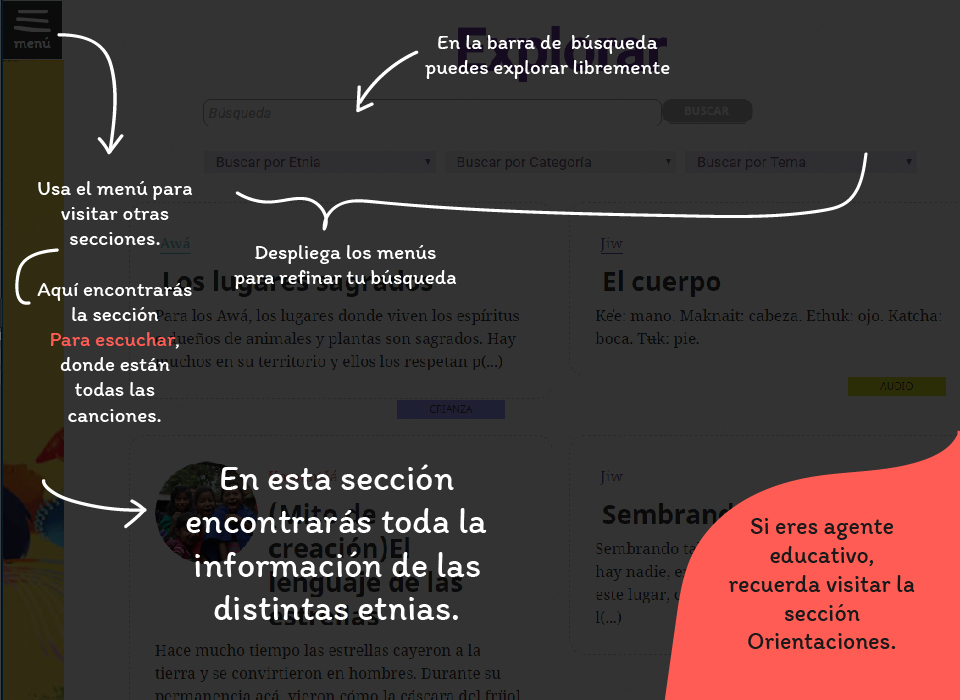Intérpretes
Traducción: Eduardo Navarro.
Lugar
Wacará, Vaupés.
El Día de la Madre es muy importante para la comunidad de Wacará. Después de ofrecer una cena a todas las mujeres, inician dos celebraciones: una en la maloca y otra en la iglesia. La chicha solo se toma en la maloca, allí se reúnen todos a cantar al son del yapurutú y del carrizo.
Canto de la mujer del clan pájaro
Tráigala, tráigala, tráigala, tráigala. No voy a emborracharme, no voy a emborracharme; ustedes me dan esa chicha; ustedes me dan esa chicha a mí, mujer; a mí, mujer,
mujer jʉohwa, mujer jʉohwa. Jamás me dejarán encima de la mesa,
yo soy una mujer que nunca ha dejado de tomar chicha.
Esa mujer soy yo, esa mujer soy yo;
a mí, a mí, a mí me pensarán, que voy a morir tomando chicha.
No será así, no será así, la mujer de acá está acostumbrada a tomar chicha.
Día tras día, día tras día, día tras día, no he dejado de tomar, yo soy esa mujer, yo soy esa mujer.
Me han dicho mis hijos, me han dicho mis hijos, me dicen mamá, mamá, no se emborrache más, me han dicho mis hijos.
Una cuyita de pura caña no me hará nada, nunca me hará emborrachar. Tráigala a ver, tráigala a ver, a mí, a mí.
Yo le voy a dar a ustedes, mi chicha no se quedará perdida.
Cuyita de caña no se echará a perder, yo también tomo de esa cuya;
no me hizo nada, no me hizo nada,
no me hizo nada, no me hizo nada.
La mujer de otro clan jamás me va a alcanzar a mí, desde hace tiempos, a mí, a mí.
Yo no soy mujer de ese territorio, soy de
otra parte, siempre soy de otra parte, soy la esposa del clan jedehwã, soy la esposa del clan jedehw.
Siendo viejita, siendo viejita, yo me casé, les dije, les dije, les dije.
En cualquier día, hablando de mí, no me alcanzarán, no me alcanzarán, ni en cualquier día, hablando de mí.
Así digo yo a ustedes.
Ser jʉohwa es pertenecer al clan pájaro y ser jedehwã es pertenecer al clan loro.
Jʉohwa wilih ewát
Ʉʉb jʉoh ene, ʉʉb jʉoh ene, ʉʉb jʉoh ene, ʉʉb jʉoh ene, maih canit, maih canit yeeb boó weemdih wʉhna yʉhcaá weemdih, weemdih, weemdih, weemdih.
Jʉohwa wilidih, jʉohwa wilidih debolih pohba yaha ñita jwej jʉ weemdih weemdih paamtjeh baáp ñʉʉhnih cá̃ac wilidih beh beh waát jʉm peanap be weemboo, weemboo, weemboo, weemboo.
Wʉnmina caá wʉnmina caá niíjna yʉhcaá weemdíh weemdíh weemdíh weemdíh
caanjih bej canit, caanjih bej canit baáp ponih cá̃ac wilih jʉohwa wili, jʉohwa wili
ded yeajaapdih ded yeajaapdih baapnih cá̃ac wilih jʉm peanap beé weem caá bʉca, weem caá bʉca, weem caá bʉca, weem caá bʉca, weem caá bʉca.
Niíj naah bʉt wã wehbit boo wã weeh boó weemdih niíj mamá mamá maih caboó niíjna bʉt wã weeh weendíh, weendíh.
Dií maac chobitdih depahnih na pohba tigaá wãta máih jʉ wa niíjna caá weemboo, weemboo ʉb jʉoh en tiguá ʉb jʉoh en tiguá ʉb jʉoh en tiguá ʉb jʉoh en tiguá,
yeebdih wá jwʉba minna caá wiíh maac chooboo yeebdih jwej caniít weembodih,
jwiíh maác chʉbit yeebdih jweej caan bee dií maac chʉdih tibeé wã babap yʉh bee, jweej caan beé, jweej caán beé weemdíh weemdíh.
Jʉohwa wilidih jʉohwa wilidih depolih pohba yaa yata toah jʉʉh weemdíh jʉʉh biíh maah bolidih maah bolidih.
Nin baácdih boli niíh caán beé biíh cá̃ac wilih jʉm peana beé jedehwã aá be weemboó jʉmʉp be yaha,
beeh wilinihna weémboó wã aa jʉmʉp bee yaha, deéd yeojapdih pohba yaha niíjna weemdíh toah canit
ded cá̃ac pohba yeebboó niíjna, weemdíh yata toah canít,
niíjna bʉt yeebdih weém.

 menú
menú






